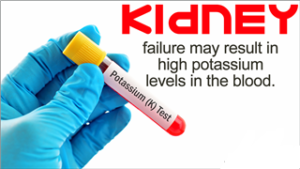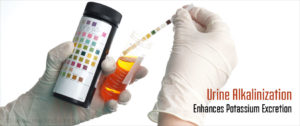Nutrition
High Potassium Side Effects (hyperkalemia)
Potassium is an essential electrolyte, which is a mineral your body needs to function correctly. Potassium is especially important for your nerves and muscles, including your heart.
While potassium is important to your health, getting too much of the nutrient can be just as bad as, or worse than, not getting enough. Normally, your kidneys keep a healthy balance of potassium by flushing excess potassium out of your body. But for many reasons, the level of potassium in your blood can get too high. This is called hyperkalemia, or high potassium.
According to the Mayo Clinic, a normal range of potassium is between 3.6 and 5.2 millimoles per liter (mmol/L) of blood. A potassium level higher than 5.5 mmol/L is critically high, and a potassium level over 6 mmol/L can be life-threatening. Small variations in ranges may be possible depending on the laboratory.
Whether you have mild or severe hyperkalemia, you should get prompt medical attention to prevent possible complications.
Several things can cause hyperkalemia, including health problems and use of certain medications.
Kidney failure
Kidney failure is the most common cause of high potassium. When your kidneys fail or don’t function properly, they can’t remove extra potassium from your body. This can lead to potassium buildup.
Other health conditions
High potassium can also be linked to certain health problems, such as:
- dehydration
- type 1 diabetes
- Addison’s disease
- internal bleeding
Medications
Certain medications have been linked with high potassium levels. These include:
- certain chemotherapy drugs
- angiotensin-converting enzyme (ACE) inhibitors
- angiotensin receptor blockers
Supplements
Overuse of potassium supplements can increase your potassium levels to a range that’s higher than normal or even dangerous.
Alcohol or drug use
Heavy alcohol or drug use can cause your muscles to break down. This breakdown can release a high amount of potassium from your muscle cells into your bloodstream.
Trauma
Certain kinds of trauma can raise your potassium levels as well. In these cases, extra potassium leaks from your body cells into your bloodstream. Burns or crush injuries where a large number of muscle cells are injured can cause these effects.
The symptoms of high potassium depend on the level of the mineral in your blood. You may not have any symptoms at all. But if your potassium levels are high enough to cause symptoms, you may have:
- tiredness or weakness
- a feeling of numbness or tingling
- nausea or vomiting
- trouble breathing
- chest pain
- palpitations or irregular heartbeats
In extreme cases, high potassium can cause paralysis or heart failure. If left untreated, high potassium levels can cause your heart to stop.
Because the effects of high potassium can be serious, it’s important to address this condition right away. If you have any of the symptoms above and you’ve been diagnosed with high potassium or have reason to think you have it, call your doctor right away. If your symptoms are severe, call 911 or go to the nearest emergency room.
If you have extremely high potassium levels, you’ll need to be hospitalized until your levels return to normal.
A blood test or urine test can help your doctor diagnose hyperkalemia.
Your doctor will routinely do blood  tests during your annual checkup or if you’ve recently started a new medication. Any problems with your potassium levels will show up on these tests.
tests during your annual checkup or if you’ve recently started a new medication. Any problems with your potassium levels will show up on these tests.
If you’re at risk of high potassium, it’s important to have regular checkups. This is because you may not be aware you have high potassium levels until you start developing symptoms.
The typical goal of treatment for high potassium levels is to help your body get rid of the excess potassium quickly and to stabilize your heart.
Hemodialysis
If you have high potassium due to kidney failure, hemodialysis is your best treatment option. Hemodialysis uses a machine to remove waste from your blood, including excess potassium, when your kidneys cannot filter your blood effectively.
Medications
Your doctor may also prescribe drugs to treat your high potassium levels. These may include:
Calcium gluconate: Calcium gluconate can help reduce the effect that potassium has on your heart until high potassium levels are stabilized.
Diuretics: Your doctor might also prescribe diuretics, which are pills that cause you to urinate more. Some diuretics increase the amount of potassium excreted by the kidneys while other diuretics do not increase potassium excretion. Depending on your potassium level, your doctor might recommend one or more of the following types of diuretics:
- loop diuretics
- potassium-sparing diuretics
- thiazide diuretics
Each type of diuretic targets a different part of the kidneys.
Resin: In some cases, you may be given a medication called a resin to take by mouth. Resin binds with potassium, allowing it to be removed from your body during your bowel movements.
If your high potassium is severe, you must get treatment right away. But if you have mild high potassium, you may be able to help reduce your potassium levels at home. Be sure to follow your doctor’s instructions for treating your high potassium, and talk to your doctor before trying these methods.
Reduce your potassium intake
One of the easiest ways to lower your potassium levels naturally is to reduce the amount of potassium in your diet. This means limiting foods and supplements that are high in potassium some foods that are high in potassium include:
- bananas
- nuts
- beans
- milk
- potatoes
- apricots
- cod
- beef
Talk to your doctor for suggestions about the best diet plan for you. You can also ask them for a referral to a dietitian or nutritionist.
Check your salt substitutes
Some salt substitutes are also high in potassium. When you buy a salt substitute, make sure to avoid any that list potassium chloride as an ingredient. Foods that are high in additives, such as commercial baked goods and sports drinks, are also usually high in potassium.
Drink more water
Dehydration can make high potassium levels worse. Try to drink more water.
Avoid certain herbs
If you take herbs for any reason, be aware that there are a few herbs you should not take if you have high potassium levels. Alfalfa, nettle, and dandelion can increase your potassium levels, so be sure to avoid them.
Because symptoms of high potassium may not appear in the early stage, you should get regular blood tests if you’re at risk for this condition.
If your blood tests show that you have high potassium levels, your doctor will choose the treatment plan that’s right for you. If your levels are dangerously high, your doctor may prescribe hospitalization or dialysis. But if your potassium levels are slightly elevated and you don’t have any other symptoms of hyperkalemia, your doctor may choose to monitor your condition and order a follow-up test.
In either case, with prompt intervention, high potassium can be treated.

